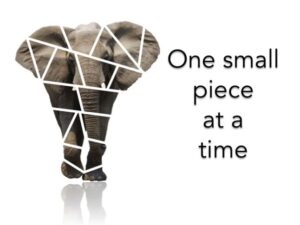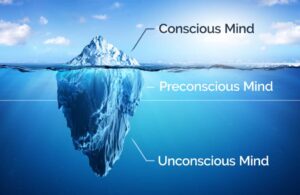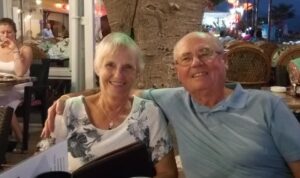Posted with permission from Sheila’s family.
Every now and again, with a little bit of good fortune or by putting myself in new and interesting places, I have the pleasure of meeting someone who fundamentally changes me. The last time it happened her name was Sheila – a magnificent woman in her 70s who sadly passed away from cancer in 2023. My intention with this post is to celebrate her and to recognise that we don’t have to know someone very well or see them every day for them to leave a lasting impression on us.
I’d heard the question before, ‘how do you eat an elephant?’ People like to bring it out at training seminars or send it round the internet as a thought-provoking meme, but there’s a difference between hearing a story or seeing something on social media, and watching someone embody a mantra, resulting in you having a lived experience you can refer back to.
How do you eat an elephant?
The premise is that sometimes a task is too huge that it becomes overwhelming – we freeze, we procrastinate, we distract ourselves – exactly what it would be like to try and eat an entire elephant (not literally, that would be barbaric). The solution is to break things down into manageable chunks and focus on each bit at a time. Before you know it, you’ve made significant progress.
- Overwhelmed by the amount of revision you need to do? Break it down into subjects, then break that down into topics. Focus a little time on each one and after a while, you make steady progress.
- Worried about preparing for a huge project? Set yourself weekly or monthly deadlines to complete the next most important thing. Before you know it, the huge project feels much more manageable.
Engaging Mind and Body
One thing we forget however, especially in this modern, tech age is that our mind is only part of our experience. We acquire knowledge all the time but I believe that only through integration with our body* do we turn that knowledge into wisdom.
I can think anything I like – my thoughts are not my beliefs – but my actions and the words I say, or who I choose to portray to the world all tell the story of who I am and who I’m trying to be. Even as you read this blog post you’re assimilating knowledge from the story I’m telling. As sad as it might make me as the author, you simply won’t have the same experience as if you were living the story with me.
I already knew how to ‘eat an elephant’ but thanks to Sheila I got to experience what it means, and with that situation in both my memory and my muscles I can recall the moment she changed my mindset about how to handle hard situations.
The Climb
A group of us were hiking up a mountain at the back of a Turkish village during the slightly cooler Autumnal month of October. The walk was due to take us a few hours and we were of varying age and fitness. Sheila, I knew, had run marathons back in the day. She was now in her 70s and had been in and out of remission from cancer. As we reached the last 45 minutes of the climb, I (as a reasonably fit 30-something year old) was starting to feel the heat, sweat and subtle breathlessness of the altitude. Up ahead of me was Sheila and I could see her hunched over, slowly plodding along. If I was feeling like I was goodness knows how she was getting on. I decided to check on her so I upped my pace and breathlessly came alongside this petite older lady, dripping in sweat to ask, “how are you doing, Sheila?” Her reply has been my mantra for hard situations ever since. With a smile on her face that I’ll never forget, she said,
“Nibble, nibble nibble.”
And her steps were doing exactly that. Close together, in a steady rhythm, she was plodding. Nibbling at the mountain the way we’re told to eat an elephant. Except rather than chunks (which still feel alarmingly sizable) she was focussing on one small mouthful at a time. Nibbling at it.
Embodying Learning
We forgot the importance of embodied learning for it’s ability to stick with us, in both our memory, our emotional memory and our body. Following this experience with Sheila I got a little curious about why knowledge is less sticky than experience and it turns out it’s all to do with the role of our consciousness and our inherited biology. It’s within consciousness that we ‘know’ things. It’s our conscious mind that takes in information via sensations, feelings, ideas and perceptions and turns it into things we can think about and remember. It’s our body that has instinctive reflexes. So whilst our mind can deliberately accumulate information, such as ‘how eating an elephant is done in chunks’, it’s the body that remembers a time when I was feeling exhausted and in awe of how Sheila’s ‘nibble’ mindset was helping her overcome a challenge.

We tend to greatly admire the perseverance we see in others, recognising it as an important ingredient for satisfaction. It’s why TV shows like X Factor give you a back-story to the contestants, sharing with you why someone wants to be on the show, what fears they’ve faced, or the trials in their lives that they’ve overcome through music and singing. Perseverance requires having organised consciousness so that it works with us rather than against us, and I believe it’s actually this trait that we revere in others. In practical terms, this is the difference between mimicking Sheila’s mantra of ‘just nibble at it’ (which is an example of organised thought and a story I can repeat to myself), versus negative self-talk such as ‘this is too hard’, ‘I’m not good enough’ or ‘look how much farther I have to go’ (disorganised thought). Bringing order to our conscious mind allows us to control our feelings and thoughts, and having experienced the lesson at such a pivotal time within a difficult environment meant that my instincts now trust the knowledge and know it to be true. All aspects of my systems of Being now believe that if I just nibble at a task, eventually I will achieve it.
Sheila offered my conscious mind some order by providing a mantra I could repeat to myself, but the lived memory, the emotional attachment to it, and the beliefs I formed from it, have also offered order to the habits within my unconscious mind (my whole self) and made the lesson even more sticky.
It’s a joy to get to honour this lesson and the legacy of a woman like Sheila by telling a very simple story about a moment in time that she no doubt forgot all about, but it’s one that has stuck with me and a story I often tell (to myself and other people) when there’s a huge challenge afoot. A calm mind is an ordered one, and sometimes a simple mantra will do the trick.
The next time you have a hard task looming, what mantra could you create to help organise your thought and keep you on track?
*By calling it ‘body’ and ‘mind’ I’m attempting to explain the difference between the unconscious and conscious mind. Instinctual feelings versus logical thinking.

